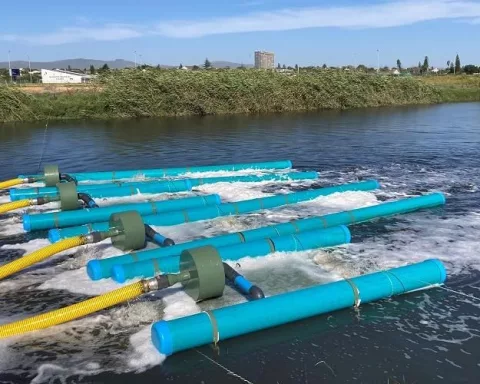The Port of Cape Town is facing an export crisis due to inefficiencies and underperformance, and private sector involvement is urgently needed to enhance the port’s efficiency and ensure economic growth for the Western Cape and South Africa. A 10% increase in exports leads to 1% GDP growth, and the involvement of the private sector can significantly improve port operations. The need for private sector participation is critical to generating thousands of jobs in the province and throughout South Africa and to realizing the region’s immense economic potential.
What is the critical need for private sector involvement in the Port of Cape Town?
The Port of Cape Town is facing an export crisis due to inefficiencies and underperformance. Private sector involvement is urgently needed to enhance the port’s efficiency and ensure economic growth and job creation for the Western Cape and South Africa. A 10% increase in exports leads to 1% GDP growth, and the involvement of the private sector can significantly improve port operations.
Export Crisis Looming in the Western Cape
The Western Cape, renowned for its stunning landscapes and vibrant agricultural sector, is on the verge of an export crisis. Although a 25% increase in agricultural goods for export was experienced due to favorable rains, the Port of Cape Town (PoCT) is grappling to cope with the rising demand for efficient operations. This imminent crisis underscores the pressing need for private sector involvement to guarantee the port’s function as an economic ally and a driving force for the region’s development.
Mireille Wenger, the provincial Minister of Finance and Economic Opportunities in the Western Cape, announced the expected growth in agricultural exports. However, the Port of Cape Town, a major conduit for these products, confronts significant challenges, particularly concerning vital equipment such as Rubber-Tyred Gantries. Frequent malfunctions make these crucial machines unable to load containers onto and off trucks promptly.
During the initial two weeks of October 2023, numerous inefficiencies at the port were noted:
- Vessel waiting time at anchor averaged 4.9 days, rather than the 1-day target.
- Vessel turnaround time averaged 10 days, instead of the 4-day target.
- Containers moved averaged 9,197 twenty-foot equivalent unit (TEUs) containers, compared to a target of 20,000.
- Truck turnaround time averaged 77 minutes, rather than the 35-minute target.
- Night shift utilization averaged 13.5%, instead of a 20% target.
This growing divergence between actual performance and goals highlights the urgent necessity for private sector intervention, as Wenger emphasized. The Ports of Durban and Ngqura have started to welcome private sector involvement, providing a valuable lesson for the Port of Cape Town.
The Economic Impact of Efficient Port Operations
According to research by the Western Cape Government, a 10% increase in exports leads to a 1% GDP growth. To realize this, the port must serve as an effective economic partner, supported by sufficient investment in infrastructure and crucial equipment. As a result, the involvement of the private sector can significantly improve the port’s efficiency.
The Western Cape Government’s economic action plan, ‘Growth for Jobs,’ aims to triple Western Cape exports by 2035. This ambitious goal can only be achieved if the Port of Cape Town operates efficiently and meets the requirements of a growing economy.
It is crucial to acknowledge the private sector’s role in job creation and the government’s duty to assist businesses by providing a conducive environment. When the ports operate effectively, the entire South African economy gains.
The Imperative for Private Sector Collaboration
The need for private sector participation in the Port of Cape Town is critical. It is essential to accomplish the breakthrough economic growth needed to generate thousands of jobs in the province and throughout South Africa. The time has come for the private sector to collaborate with the government in enhancing the port’s efficiency and realizing the region’s immense economic potential.
The Port of Cape Town’s current situation, marked by inefficiencies and underperformance, offers an opportunity for private sector involvement to transform it into a dependable and productive force. Through cooperation and determination, this transformation can pave the way for economic growth, job creation, and a brighter future for the people of the Western Cape and South Africa as a whole.
1. What is the export crisis facing the Port of Cape Town?
The Port of Cape Town is facing an export crisis due to inefficiencies and underperformance, which is affecting the region’s economic growth potential.
2. Why is private sector involvement needed in the Port of Cape Town?
Private sector involvement is urgently needed to enhance the port’s efficiency, ensure economic growth for the Western Cape and South Africa, and generate thousands of jobs in the province and throughout South Africa. A 10% increase in exports leads to a 1% GDP growth, and private sector participation can significantly improve port operations.
3. What challenges is the Port of Cape Town facing?
The Port of Cape Town is facing challenges such as frequent malfunctions of vital equipment such as Rubber-Tyred Gantries, vessel waiting time at anchor averaging 4.9 days, vessel turnaround time averaging 10 days, containers moved averaging 9,197 twenty-foot equivalent unit (TEUs) containers, truck turnaround time averaging 77 minutes, and night shift utilization averaging 13.5%, instead of a 20% target.
4. What is the economic impact of efficient port operations?
Efficient port operations have a significant economic impact, as a 10% increase in exports leads to a 1% GDP growth. The Western Cape Government’s economic action plan, ‘Growth for Jobs,’ aims to triple Western Cape exports by 2035, which can only be achieved with an efficient port that meets the requirements of a growing economy.
5. What is the Western Cape government doing to address the export crisis?
The Western Cape Government is calling for private sector involvement in the Port of Cape Town to enhance its efficiency and ensure economic growth for the Western Cape and South Africa. The government’s economic action plan, ‘Growth for Jobs,’ aims to triple Western Cape exports by 2035.
6. How can private sector involvement improve the Port of Cape Town’s efficiency?
Private sector involvement can improve the Port of Cape Town’s efficiency by providing investment in infrastructure and crucial equipment, collaborating with the government, and transforming the port into a dependable and productive force.
7. What can the Ports of Durban and Ngqura teach the Port of Cape Town?
The Ports of Durban and Ngqura can teach the Port of Cape Town the benefits of private sector involvement in enhancing port operations and ensuring economic growth.
8. Why is private sector collaboration imperative for the Port of Cape Town’s success?
Private sector collaboration is imperative for the Port of Cape Town’s success because it can transform the port into an efficient economic partner and generate thousands of jobs in the province and throughout South Africa, resulting in economic growth for the entire country.












